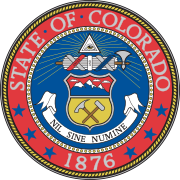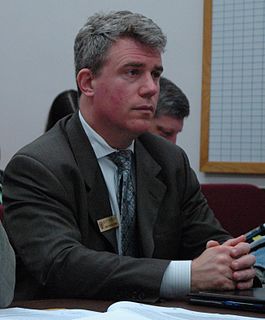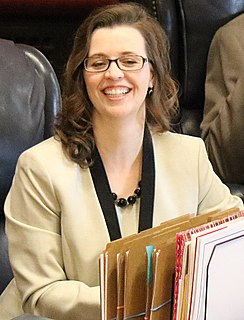| Elections in Colorado | ||||||||
|---|---|---|---|---|---|---|---|---|
 | ||||||||
| ||||||||
The Colorado recall election of 2013 was a successful effort to recall two Democratic members of the Colorado Senate following their support of new gun control legislation. Initially four politicians were targeted, but sufficient signatures could only be obtained for State Senate President John Morse and State Senator Angela Giron.
A recall election is a procedure by which, in certain polities, voters can remove an elected official from office through a direct vote before that official's term has ended. Recalls, which are initiated when sufficient voters sign a petition, have a history dating back to ancient Athenian democracy and feature in several current constitutions. In indirect or representative democracy, people's representatives are elected and these representatives rule for a specific period of time. However, where the facility to recall exists, should any representative come to be perceived as not properly discharging their responsibilities, then they can be called back with the written request of specific number or proportion of voters.

The Democratic Party is one of the two major contemporary political parties in the United States, along with the Republican Party. Tracing its heritage back to Thomas Jefferson and James Madison's Democratic-Republican Party, the modern-day Democratic Party was founded around 1828 by supporters of Andrew Jackson, making it the world's oldest active political party.

The Colorado Senate is the upper house of the Colorado General Assembly, the state legislature of the US state of Colorado. It is composed of 35 members elected from single-member districts, with each district having a population of about 123,000 as of the 2000 census. Senators are elected to four-year terms, and are limited to two consecutive terms in office.
Contents
- Background
- Submission and certification of petitions
- Challenges
- Election
- Campaign
- Replacement candidates
- Ballot challenge
- Polling
- Results
- Aftermath
- Reactions
- Polling 2
- 2014 elections
- Campaign to recall Evie Hudak; her resignation
- References
- External links
During the petition drive, national organizations on both the gun rights and gun control sides became involved by providing mailings and donations. Once the petitions were submitted, Morse and Giron challenged the effort in court, but were denied the injunction that they had requested from the court. A further court hearing resulted in the election being conducted in-person rather than by mail, which also led to Giron complaining of voter suppression.
Gun politics is an area of American politics defined by two primary opposing ideologies about civilian gun ownership. People who advocate for gun control support increasing regulations related to gun ownership; people who advocate for gun rights support decreasing regulations related to gun ownership. These groups often disagree on the interpretation of laws and court cases related to firearms as well as about the effects of firearms regulation on crime and public safety. It is estimated that U.S. civilians own 393 million firearms, and that 35% to 42% of the households in the country have at least one gun. The U.S. has the highest estimated number of guns per capita, at 120.5 guns for every 100 people.
In the election, held on September 10, 2013, both Morse and Giron were recalled by the voters of their districts and replaced with Republicans George Rivera and Bernie Herpin, respectively. It was the first time a state legislator in Colorado had been recalled. In the 2014 Senate elections 13 months later, both Rivera and Herpin were defeated by their Democratic opponents.

The Republican Party, also referred to as the GOP, is one of the two major political parties in the United States; the other is its historic rival, the Democratic Party.
George Rivera is a former member of the Colorado Senate elected in a September 10, 2013 recall election to replace Angela Giron. Rivera was elected from Colorado's State Senate District 3 which includes Pueblo, Colorado. Giron was the second ever Colorado legislator to be successfully recalled in the state's history.
William B. "Bernie" Herpin, Jr. is a former state senator in the Colorado Senate serving since September 11, 2013, a former member of the Colorado Springs, Colorado city council and a United States Navy veteran. He is a member of the Republican Party.














